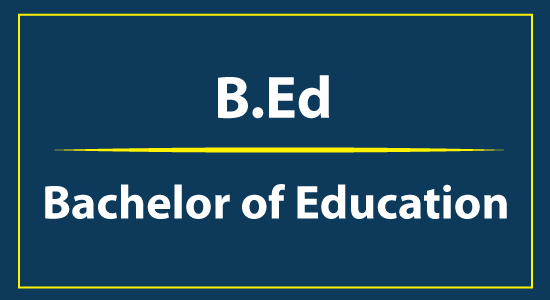
The Bachelor of Education (B.Ed.) is a degree program designed for individuals aspiring to become educators or teachers. The specific details of the program can vary by country, university, and even by specialization within education. Here are some general aspects and components typically found in a B.Ed. program:
1. Duration:
- The duration of a B.Ed. program is usually around 3 to 4 years, depending on the country and university.
2. Eligibility:
- Applicants typically need to have completed their secondary education or an equivalent qualification.
- Some universities may have specific subject requirements or entrance exams.
3. Curriculum:
- The curriculum includes a combination of core education courses, specialized courses in teaching methods, and practical teaching experience.
- Core courses may cover areas such as educational psychology, philosophy of education, educational technology, and classroom management.
- Specialized courses may focus on specific subjects or grade levels, depending on the intended teaching specialization.
4. Teaching Specializations:
- B.Ed. programs often allow students to specialize in particular areas such as elementary education, secondary education, special education, or subject-specific teaching (e.g., mathematics, science, language arts).
5. Practical Teaching Experience:
- Most B.Ed. programs include a practicum or student teaching component where students gain hands-on experience in real classrooms under the supervision of experienced teachers.
6. Research Project or Thesis:
- Some B.Ed. programs may require students to complete a research project or a thesis as part of their degree requirements.
7. Assessment and Evaluation:
- Students typically learn about assessment and evaluation methods to measure student learning and progress.
8. Professional Development:
- B.Ed. programs often include components related to professional development, ethics, and the legal aspects of teaching.
9. Educational Technology:
- Given the increasing role of technology in education, B.Ed. programs may include courses on integrating technology into teaching.
10. Certification:
- Upon successful completion of the B.Ed. program, graduates may be eligible for teacher certification, which is usually a requirement for teaching in schools.
11. Continuing Education:
- Some B.Ed. programs may encourage or require ongoing professional development to keep educators updated on current teaching methods and educational trends.
It's important to note that specific details can vary, so it's advisable to check the curriculum and requirements of the specific B.Ed. program and institution you are interested in.
Why You Choose B.Ed Course:
However, I can provide information on why individuals might choose to pursue a Bachelor of Education (B.Ed.) course:
1. Passion for Teaching:
Many individuals choose the B.Ed. course because they have a genuine passion for teaching and are interested in making a positive impact on the lives of students.
2. Career in Education:
B.Ed. is a necessary qualification for those who aspire to become teachers. It provides the essential knowledge and skills required for effective teaching in various educational settings.
3. Specialization in Education:
The B.Ed. course allows individuals to specialize in specific areas such as elementary education, secondary education, special education, or subject-specific teaching. This specialization helps individuals align their teaching career with their interests and expertise.
4. Professional Development:
B.Ed. programs not only focus on teaching methods but also cover educational psychology, classroom management, assessment, and other aspects of professional development. This comprehensive training prepares individuals for the challenges of the education field.
5. Impact on Society:
Teaching is a noble profession that contributes to the overall development of society by shaping the minds of future generations. Many individuals choose the B.Ed. course with the goal of making a positive impact on society through education.
6. Job Security:
In many countries, having a B.Ed. degree is a prerequisite for obtaining teaching certifications. Teaching is often considered a stable and secure profession, and a B.Ed. degree enhances job prospects in the education sector.
7. Personal Growth:
The B.Ed. course provides opportunities for personal and intellectual growth. It challenges individuals to think critically about education, learning theories, and effective teaching strategies.
8. Lifelong Learning:
Education is a dynamic field, and teachers often engage in continuous learning throughout their careers. Pursuing a B.Ed. degree is a starting point for a lifelong journey of professional development and learning.
9. Fulfillment of Educational Requirements:
For those who aspire to work in schools or educational institutions, a B.Ed. degree is typically a mandatory requirement for obtaining teaching positions.
Ultimately, individuals choose the B.Ed. course based on their personal and professional goals, interests, and commitment to the field of education.
